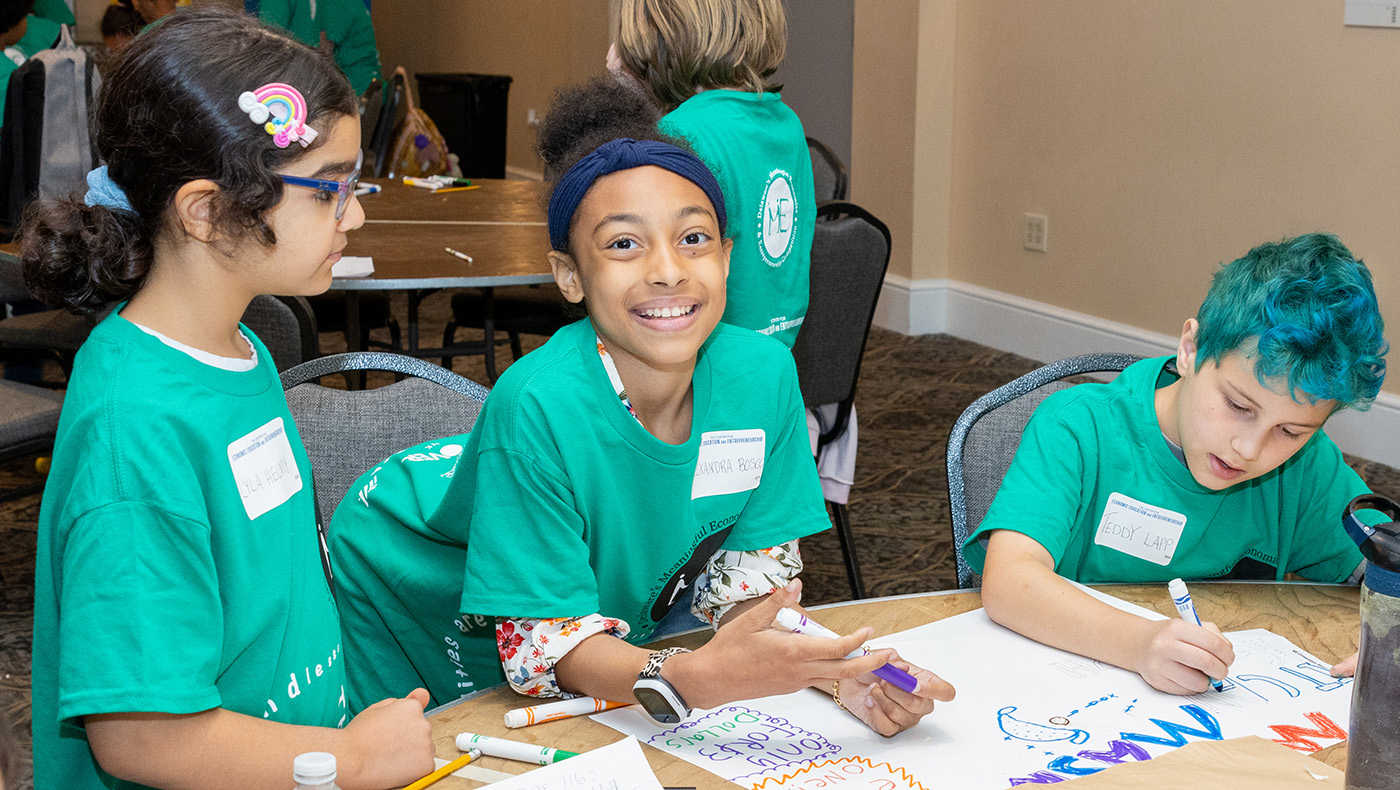As the 2023 Meaningful Economics Competition kicked off May 23 amid the happy hubbub of a roomful of third-grade students, at least a couple of adults in the room were reliving old memories.
The competition, which challenges select students from around Delaware to demonstrate knowledge of economic concepts and use creative thinking to navigate business scenarios, was back for its 35th year in 2023. The University of Delaware’s Center for Economic Education and Entrepreneurship at the Alfred Lerner College of Business and Economics runs the event. It takes place over several days, with different grades, third through fifth, competing each day, and this year was held at the Executive Banquet and Conference Center in Newark. Another single-day event is held downstate.
CEEE is all about economic education, and Erin Yetter is a dramatic example of the results. Yetter can still describe the shirt she got as a fourth-grader taking part in in the competition in 1991: purple with orange lettering. She kept it for years until losing it in a recent move. (Kids submit shirt designs each year and organizers pick a winner for the next year’s competition.)
“This competition was actually the catalyst for me becoming an economist,” she said. She graduated from UD’s Lerner College with a doctorate in economic education in 2014, has taught economics and worked with the Federal Reserve, and is now ready to begin a full time teaching position at Lerner starting in the fall.
When Yetter’s son began attending North Star Elementary School in Hockessin, she wanted him to have the Meaningful Economics experience, so she started an after-school club to train teams.
“Econ is often marginalized in the curriculum. It’s just part of social studies,” she said. But we all participate in the economy. “We deal with prices, we make decisions when we’re buying stuff every single day. And this (competition) is going to stay with them for the rest of their lives,” Yetter said, even if they don’t remember the details as well as she does.
Yetter wasn’t the only alumna there that day. Diana Magana, a teacher at Las Americas Aspira Academy in Newark, recalled attending 20 years ago as a student at Wilson Elementary.
“I still have my (prize) ribbons to this day and I just remember the experience so fondly,” she said, and she thinks it probably contributed to her eventual career choice. She came back to the competition as a teacher for the first time in 2019. “We didn’t place, but it was a really good experience just to be back here, to be able to bring a group of students and have them enjoy the experience like I did.”
About 350 children competed in the event’s various days this year. The teams participate in several challenges throughout the day. One is a teamwork exercise in which kids learn to allocate resources – this year, they assembled educational packets for use in schools. Another is a written test on economics and personal finance concepts, and a third is a problem-solving exercise.
For the last challenge, the teams pondered an economic problem: how to deal with all the leftover masks from the height of the pandemic. While there is still some demand for masks, the scenario noted, manufacturers are stuck with warehouses full of them. The children had to come up with a creative way to reuse the masks, then name the product, come up with advertising, and more. Afterward, they pitched their idea to a panel of judges.
Leasure Elementary, the eventual winners of that category on the first day, went with a skit.
“I can’t sleep at night,” one of the students announced.
“Well, we have a product for you,” the rest of the team chorused. “It’s called the sleeping mask.”
“I already tried those things. They don’t work,” the skeptical customer said.
“Well this one is different,” they informed him.
Some teams were a little tongue-tied; others more outgoing. One broke into a rhyming jingle. Some of the ideas were certainly outside-the-box.
“I want a mask that can refresh my face and turn into a cupholder,” one student reflected in another skit. “Where can I find that?” (Answer: the Mist Mask, although the team was vague on the mechanics of the cupholder transformation.)
Among the judges were volunteers from M&T Bank, Franklin Mint Federal Credit Union, and event sponsors Discover Bank and Bank of America. State Bank Commissioner Robert Glen also joined in.
It was the first time judging for Brandy Crawford, a quality representative for Discover.
“Everything was really great,” she said, although it was tough to pick from among the teams. “I wanted everybody to win.”
Bonnie Meszaros, soon-to-retire associate director of CEEE, helped start the Meaningful Economics Competition years ago and led the festivities in this latest version. She said the competition aims to teach 21st century skills: “Being able to communicate, work as a team and solve problems, be critical thinkers.”
With economic concepts, kids need to start early, she said, and build on that knowledge, learning how there’s an opportunity cost when we make choices, and how scarcity dictates what society produces.
“They live in an economic world, and they need to be able to understand,” she said.
There’s no scarcity when it comes to prize ribbons, which are awarded generously in all three categories.
It was a day to remember for Yetter’s North Star Elementary. She let out a jubilant yell when her son’s team took home first prize in the test category. The other North Star team came in second, and the test winners got a second place in the production category as well. Her students’ after-school work had paid off.
The victorious problem-solving Leasure Elementary team said they were definitely nervous about the presentation to the judges. But, the win felt “very great,” student Rhys Scott said.




